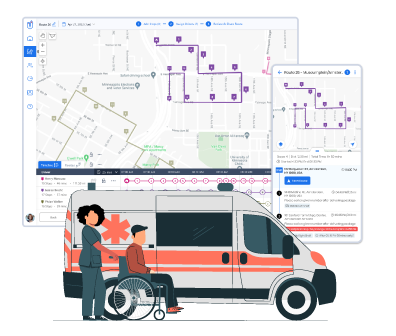Truck dispatching is a critical component of the logistics industry. The effective coordination of trucks, drivers, and cargo is essential for ensuring that goods are delivered on time, efficiently, and safely. Inefficient dispatching can lead to delays, increased costs, and customer dissatisfaction.
So, what are the key factors that contribute to efficient truck dispatching solutions? In this comprehensive guide, we’ll explore the strategies and technologies that can streamline the dispatching process and help your logistics operations run smoothly.
Efficient truck dispatching solutions have revolutionized the logistics industry, with truck dispatching software playing a pivotal role in streamlining operations and maximizing productivity.
1. Effective Route Planning
One of the fundamental aspects of efficient truck dispatching is route planning. To minimize travel time and fuel consumption, it’s crucial to identify the most optimal routes for each delivery. But how do you achieve this?
First, you must gather accurate data on road conditions, traffic, and weather. This data is invaluable for making informed decisions. Secondly, consider using route optimization software. Such tools utilize algorithms to find the most time-efficient routes, taking into account various factors.
However, these solutions aren’t foolproof. Therefore, it’s essential to continuously monitor and adapt routes as conditions change.
2. Real-Time Tracking
Real-time tracking of vehicles is a game-changer in the truck dispatching process. This technology allows dispatchers to know precisely where each truck is at any given moment. Consequently, they can make better decisions regarding route adjustments, load assignments, and scheduling.
Modern GPS and telematics systems have made real-time tracking more accessible and affordable than ever before. These systems provide up-to-the-minute information on vehicle locations and conditions, ensuring that dispatchers have the data they need to make quick, informed choices.
3. Efficient Load Management
Efficient load management is another critical aspect of truck dispatching. Dispatchers need to match the right truck with the right load. Failure to do so can result in inefficient use of resources and increased costs.
To address this, dispatchers can utilize load matching software, which considers various factors like cargo type, size, weight, and delivery requirements. This helps ensure that each truck is optimally loaded, reducing the need for multiple trips and minimizing fuel consumption.
4. Prioritization and Scheduling
Prioritizing deliveries is essential. Some shipments are time-sensitive, while others can afford a more flexible schedule. Efficient truck dispatching solutions take this into account.
Dispatchers should use a scheduling system that prioritizes deliveries based on factors like delivery windows, customer preferences, and route optimization. By grouping deliveries effectively, you can minimize backtracking and make the most of your resources.
5. Effective Communication
In any logistics operation, effective communication is paramount. Dispatchers must be in constant contact with drivers to provide updates, address issues, and ensure that everything is running smoothly.
Modern communication tools such as two-way radios, mobile apps, and messaging platforms can significantly improve communication between dispatchers and drivers. These tools facilitate quick and efficient exchanges of information, allowing for better coordination and problem-solving.
6. Data-Driven Decision Making
Data is the lifeblood of efficient truck dispatching. It provides the insights needed to make informed decisions. With accurate and timely data, dispatchers can identify trends, spot inefficiencies, and optimize processes.
To harness the power of data, logistics companies should invest in robust fleet management software that collects, analyzes, and presents data in a meaningful way. This data can range from fuel consumption and vehicle maintenance to driver behavior and route performance.
7. Automation and Artificial Intelligence
Automation and artificial intelligence (AI) are rapidly becoming essential tools in truck dispatching. These technologies can handle routine tasks, freeing up dispatchers to focus on more complex, strategic aspects of their roles.
Automation can take care of tasks like order processing, route planning, and load optimization. AI can analyze historical data to predict demand, helping dispatchers proactively manage resources.
8. Driver Training and Support
Efficient truck dispatching solutions aren’t solely reliant on technology. They also depend on the skills and knowledge of your drivers. Dispatchers should ensure that their drivers are well-trained, understand safety regulations, and can handle various aspects of the job.
Regular training and support are vital for keeping drivers up to date with best practices and regulations. A well-trained driver is more likely to handle unforeseen situations effectively and make on-the-spot decisions that benefit both the company and the customer.
9. Maintenance and Vehicle Inspections
To keep a fleet of trucks running efficiently, regular maintenance and inspections are essential. Neglecting this aspect can result in costly breakdowns, delays, and safety concerns.
Implementing a robust maintenance schedule and conducting pre-trip inspections can help identify and address issues before they become major problems. A well-maintained fleet is more reliable and less likely to experience unplanned downtime.
10. Compliance with Regulations
The trucking industry is heavily regulated, and compliance is non-negotiable. Violating regulations can lead to fines, shutdowns, and reputation damage. Therefore, it’s crucial for dispatchers to stay informed about current regulations and ensure that all drivers adhere to them.
Common regulations pertain to hours of service, vehicle weight limits, and environmental standards. Dispatchers should keep drivers updated and use technology to monitor and enforce compliance.
11. Contingency Planning
Even with the best dispatching solutions in place, unforeseen events can disrupt operations. It’s essential to have contingency plans for such situations.
Contingency planning involves identifying potential risks and developing strategies to mitigate them. For instance, if a vehicle breaks down, there should be a plan in place to quickly replace it or reroute deliveries.
12. Customer Service
Efficient truck dispatching isn’t solely an internal matter. It also affects customer satisfaction. Dispatchers should maintain open lines of communication with customers, providing accurate delivery estimates and updates on the status of their shipments.
Excellent customer service can lead to repeat business and positive referrals. It’s a crucial aspect of building a strong reputation in the logistics industry.
13. Sustainability and Environmental Concerns
In today’s world, sustainability and environmental concerns play a significant role in logistics. Dispatchers should seek ways to reduce the environmental impact of their operations.
Efficient route planning, load optimization, and the use of fuel-efficient vehicles are all strategies that can contribute to a greener and more sustainable truck dispatching process.
14. Cost Management
Cost control is a constant challenge in the logistics industry. Dispatchers should closely monitor expenses related to fuel, maintenance, labor, and technology. By identifying areas of overspending, they can make adjustments to reduce costs.
Effective cost management can lead to improved profitability, making it a critical aspect of efficient truck dispatching solutions.
15. Continuous Improvement
Efficiency is not a one-time achievement; it’s an ongoing process. To maintain efficient truck dispatching solutions, it’s essential to promote a culture of continuous improvement within the organization.
Regularly review processes, analyze data, and seek feedback from drivers and customers. Use this information to identify areas that can be refined and enhanced.
16. Collaboration with Stakeholders
Efficient truck dispatching isn’t an isolated function. It involves collaboration with various stakeholders, including shippers, suppliers, and other partners in the supply chain. Effective communication and coordination with these parties are essential to ensure that deliveries run smoothly.
17. Adaptability to Changing Circumstances
The logistics industry is subject to constant change. New technologies, regulations, and market conditions can all impact truck dispatching. Being adaptable and open to change is a crucial part of remaining efficient in a dynamic industry.
Therefore, dispatchers should stay informed about industry trends and be prepared to adjust their strategies and technology as needed.
18. Case Studies: Real-World Examples
To better understand efficient truck dispatching solutions, let’s examine a few real-world case studies that illustrate the benefits of various strategies and technologies.
Case Study 1: Route Optimization
A transportation company in the Midwest implemented route optimization software to improve its delivery operations. The software used real-time traffic data to identify the fastest and most efficient routes for its trucks.
As a result, the company saw a significant reduction in travel time, fuel consumption, and vehicle wear and tear. This not only improved overall efficiency but also led to cost savings and a more reliable delivery schedule.
Case Study 2: Real-Time Tracking
A national logistics company incorporated real-time tracking technology into its fleet. This allowed dispatchers to monitor the exact location and status of every vehicle in the field.
With real-time tracking, the company could respond swiftly to unexpected delays or issues. This proactive approach reduced the number of delivery disruptions and improved customer satisfaction.
Case Study 3: Load Optimization
A regional distributor adopted load optimization software to better match its deliveries with available trucks. By considering factors like cargo size, weight, and delivery windows, the software ensured that each truck was optimally loaded.
The result was a reduction in the number of trips required for deliveries. This not only saved fuel but also reduced wear and tear on the vehicles, resulting in long-term cost savings.
19. Challenges in Implementing Efficient Truck Dispatching Solutions
While there are numerous benefits to implementing efficient truck dispatching solutions, there are also challenges that must be addressed.
Challenge 1: Initial Investment
Implementing new technologies and processes can require a significant initial investment. This can be a barrier for smaller logistics companies with limited capital.
Challenge 2: Resistance to Change
Change is often met with resistance from employees. Some drivers and dispatchers may be hesitant to embrace new technologies or adapt to new processes.
Challenge 3: Data Security
The use of technology in truck dispatching necessitates the collection and storage of sensitive data. Ensuring the security of this data is a critical concern, given the prevalence of cyber threats.
Challenge 4: Scalability
As a logistics company grows, its dispatching needs may become more complex. Scalability is a challenge when trying to maintain efficiency while expanding operations.
Challenge 5: Regulatory Compliance
The trucking industry is highly regulated, and compliance with evolving regulations can be a significant challenge. Staying updated and ensuring adherence to regulations is a continuous effort.
Conclusion
Efficient truck dispatching solutions are essential for the success of any logistics operation. They help reduce costs, improve customer satisfaction, and ensure that goods are delivered on time.
By focusing on route optimization, real-time tracking, load management, communication, data-driven decision-making, automation, driver training, maintenance, compliance, contingency planning, customer service, sustainability, cost management, continuous improvement, collaboration, adaptability, and learning from real-world case studies, logistics companies can achieve their goals of efficiency and excellence.
Challenges will arise, but with the right strategies and technologies in place, these challenges can be addressed and overcome. In a rapidly evolving industry, embracing change and continually striving for improvement is key to maintaining efficient truck dispatching solutions and a competitive edge in the market.




